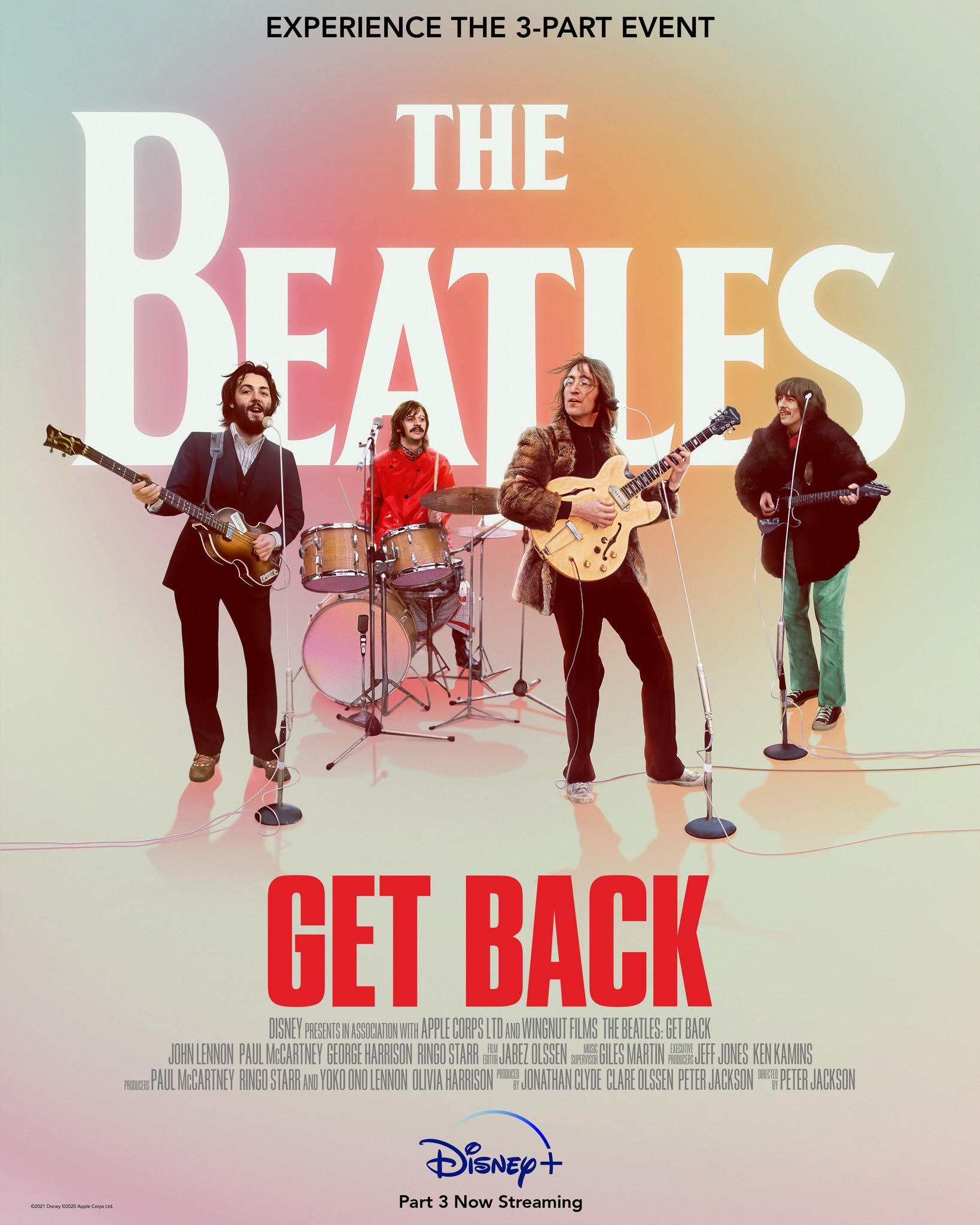Like comedian podcaster Marc Maron tweeted, “The Beatles are exactly like I thought they would be. I’ve known them all my life. This is the first time we’ve hung out though.”
Fans across the board who tuned into the anticipated three-part, 8-hour event released to Disney+ over Thanksgiving weekend shared this sentiment. In fact, any pre-emptive fears the docuseries’ length would scare off interested parties dissipated with each additional reviewer declaring they wished even more of the 60- plus hours of unearthed footage were included in the final cut.
Their backs against the wall during the January 1969 “Get Back” sessions calling for them to write and record a 14- song album then perform in front of a live TV audience for the first time in years, the Fab Four’s reported tensions at the time would see them permanently on the outs by year’s end.
However, as acclaimed British director Peter Jackson of The Lord of the Rings fame indicated in his latest project’s first preview trailer – then uniformly demonstrated across each installment of his latest three-pronged mammoth – the footage provides a point running counter to the notion “Get Back” was a miserable experience all-around.
Instead, viewers are fully immersed, while please to find – as it’s not over-explained, rather told through a series of simply edited invitations to co-experience – that they can join John Lennon, Paul McCartney, George Harrison and Ringo Starr for the ride as they travel it themselves; devoid of talking head disruption, voiceover commentary and so forth.
Viewers are encouraged to riff along with The Beatles,who have been damn-near mythologized by pop culture pulse-keeping historians (and rightfully so) in the years since, as they reveal themselves also as cartoonishly motivated kids at heart – albeit with stupendously large bank accounts, fame and obligatorily steep egos. Dressed down, without “Sgt. Pepper” or India garb for cover, The Beatles were still victims of their own image; desperate to check their prestige at the door in the hope they could supplant dead noise between transcendent takes with improvised belching and guard-down, silly-voiced soliloquies that would put the South Park writers room to shame.
Together, especially when mid-rehearsal, The Beatles remind audiences – and each other – tensions can cease during those four or five minute recording periods, and the decompression to follow. They find escape through the familiarity, seamlessly transforming back into the “four boys from Liverpool” in favor of the “Bigger than Jesus” burden of expectation society demanded they remain.
The industry-revolutionizing pillars of the endless styles they partook in and popularized, if not invented altogether, return as the kids they were at heart and willingly sought to hold onto at this depicted moment in time. Recognizing their respective post-“Beatlemania” forays into fatherhood, family formation and solo musical endeavors where they could all be the lead for a change meant the practicality of maintaining togetherness under a shared ‘Beatles’ umbrella was running dry, and fast.
Get Back does not seek to take away from their miraculous talent, merely shed further light on the sheer creative impossibilities that transpired while cameras rolled. Included, in lieu of spoilers pertaining to breakthroughs on specific songs: a George walkout (and subsequent return) here, a shameless Paul admission of grabbing the leadership reins from a distracted John Lennon there, and inclusion of Yoko Ono as an occasional jam partner. The latter dispels the long-held wrap she, or any other non-Beatle, could bring the group to a swift end.
The thirty-some-minute, extended and never-before-seen edition of the rooftop concert is also compact with impressively edited split screen shots offering a window into how the band and its team pulled off the ultimate neighborhood disturbance amid heavy local police pushback. Isn’t this climactic sequence worth the price of admission alone?
When reaching the culmination of the best “rock doc” since Woodstock, viewers will pick up on various callbacks and in-jokes to moments foreshadowed earlier. The Beatles’ body language, nods, gestures, lyrical mishaps and full-on mumbled-in-gibberish botched lines gain their proper context in the sendoff of their public persona, speaking to how quickly they had to assemble this batch of songs together just prior to forever unleashing them into the iconographic zeitgeist.
Billy Preston has long been argued as the metaphorical fifth Beatle based on his contributions to these sessions alone; however, Jackson and company prove the fifth Beatles was – and always will be – the audience; it’s for them, the Beatles first “invaded,” and through them once more, they’ve burst back to life.
Jackson first proved it with 2018’s They Shall Not Grow Old, his colorized WWI footage documentary, and solidified himself as a master of yet another film discipline by not taking the privilege of unlocking musical gold lightly. His fly-on-the-wall joint stars moptop abandoners who, by that time, had let their hair grow long as their art grew even wider than already considered.
“Two of Us” is a simultaneous joy and heartbreak-inducer; seeing John and Paul stand up and duet together one last time, its lyrics supposedly commenting on the trajectory of their journey as songwriting – and overall – partners. “I’ve Got a Feeling” takes on a whole new meaning with each refrain amid Covid-19 (“Everybody had a hard year…”) “Get Back,” “Let it Be” and “The Long and Winding Road” are further cemented as the classics they are. And “Don’t Let Me Down…” with fan service of this ilk for the benefit of generations of socialites, how could they ever?
See it to believe it. Get back to where you once belonged by streaming the three-part documentary, now available on Disney+.







